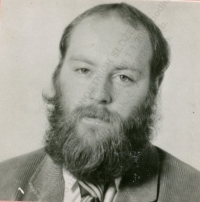Before that, I was telling myself that I couldn´t have a family as I could have been blackmailed by the Secret Police, then I felt that freedom came so I could start a family
Download image
Kamil Zajíček (born Huška) was born on Augst 25th of 1965 in Vítkov. Since his youth, he sought the company of long-haired friends called ‘máničky’ back then. In 1983, he started his compulsory military service as a patrol unit member. Despite the fact that after a year of hazing, bullying and humiliation, he was now considered a senior soldier and could expect better conditions, he still thought about leaving the army prematurely. In the end, he managed to leave his unit half a year before his term as he signed a one-and-a-half-year contract with the OKD. There he joined an elite mining crew at the Rudý říjen (The Red October) mine in Ostrava-Heřmanice, known for its outstanding performances. Unlike his colleagues, he was aware of the totalitarian nature of the communist regime and opposed it actively. He had been distributing samizdat literature, screening banned films and participated in protests. On February 25th 1989, Kamil Zajíček and his brother tried to organise a commemoration of Jan Zajíc´s self-immolation in Vítkov, on the twentieth anniversary of his deed. However, they had been arrested by the police. Apart from the samizdat literature and other paraphernalia, policemen confiscated their petition addressing president Gustáv Husák during the house search, in which they urged him for human rights and international agreements to be respected. Then, charges had been brought against both of them for breaching the peace by the authorities. Kamil Zajíček had been repeatedly interrogated by the Secret Police and he had been transferred to a job position with a much lower salary. After their case had been covered by the Radio Free Europe, charges against them were dropped in June of 1989. Since March 1989, Kamil Zajíček has been living in Jeseník, where he also married Dana Zajíčková in August 1991, taking her surname and fathering four children. In March 2019, he received the Certificate for Participation in anti-communist Opposition and Resistance.
